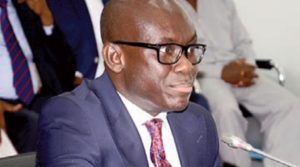Attorney-General accuses media of distorting information on Opuni trial

The Office of the Attorney-General and Minister of Justice has accused the media of distorting information on the composition of a panel to hear an appeal before the Supreme Court.
The panel is to hear the case titled “Republic vrs Dr Stephen Opuni & 2 Others.”
In a statement, the Attorney-General and Minister for Justice, Mr. Godfred Yeboah Dame, stated that the publications in various newspapers contained false information.
The media reports implied that the composition of the panel for the appeal hearing on May 8, 2024, was unusual, questionable, or in violation of the Constitution.
Mr Dame said the Supreme Court heard arguments in Dr Opuni’s appeal against an order of the Court of Appeal dated July 3, 2023, for adoption of evidence led in that on May 8, 2024, rather than any earlier date.
The appeal was originally scheduled for a hearing at the Supreme Court on January 17, 2024, and no written comments had been filed by that date.
He said that the sole procedure filed in the proceedings was a mere notice of appeal, and that the Supreme Court did not request any of the parties to make oral statements in favor or opposition to any of the grounds of appeal submitted by the appellant.
Mr Dame said no arguments were heard by the Supreme Court on 17th January 2024.
He said that the Court gave directions for the future hearing of the dispute by ordering the appellant, Dr Opuni, to file his written submissions within 21 days and the respondent, the Republic, to file her written submissions within 21 days after receiving the appellant’s submissions.
The appellant was given an additional seven-day period to file a response after receiving the respondent’s submissions.
The parties complied with the Court’s directives, and the appeal was scheduled for hearing on May 8, 2024.
He said on that date, the Chief Justice reconstituted the panel for the hearing of the appeal in accordance with her authority under the Constitution of 1992.
Mr Samuel Codjoe, Counsel for Dr Opuni, raised an unusual objection to the panel’s reconstitution, and insisted on the previous panel hearing his appeal under Article 157(3) of the Constitution.
The A-G, then prayed the Court to dismiss the objection and noted that the operative words in article 157(3) of the Constitution which stares “… no person sitting in a Superior Court shall, having heard the arguments of the parties to that cause or matter and before judgment is delivered, withdraw as a member of the court …, until judgment is delivered”.
He stated that there were neither oral nor written arguments in the case heard on January 17, 2024, so article 157(3) was not triggered.
The Court, after considering the submissions of both counsels, overruled the objection.
The A-G said that several media outlets connected with Dr. Opuni had repeatedly attempted to distort the impact of court proceedings involving the prosecution of the former Chief Executive of the Ghana Cocoa Board.
He said that those publications frequently misrepresented the facts presented at the trial, with the intention of ridiculing the prosecution’s case and creating erroneous perceptions about the soundness of Dr Opuni’s defence.
The A-G observed that most of the publications on the “Opuni case,” orchestrated by the accused, violated the limitations of permissible speech because they were intended to pervert the course of justice or prejudice the fair hearing of that case.
Nonetheless, he said the Republic was committed to presenting credible evidence to back up the allegations against all the accused in the case and would not be intimidated by the process.
The A-G said no party to court proceedings had the right to insist on a particular court or panel of a court to hear his or her case.
In accordance with the Constitution and the Courts Act, 1993 (Act 459), the Chief Justice determines the composition of every court for the hearing of any matter.
The Chief Justice is a member of every court in the country and has the power to request in writing a Justice of any of the Superior Courts of Judicature to sit on either the Court of Appeal or the High Court at any time.
Furthermore, consistent with article 128(3) of the Constitution, the Chief Justice presides at sittings of the Supreme Court, and in his absence, the most senior of the Justices of the Supreme Court, as constituted, shall preside.
He said a deliberate disregard of those basic principles was inimical to the sound adjudication of cases and portends danger for the entire society.
Source: GNA
